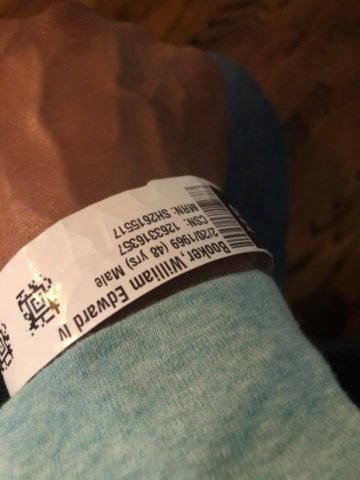The accompanying picture is one I took of those really cool bracelets they give you when you are admitted to the hospital. I got one just last week, after my second visit to the emergency room in two months. As you may have read last month, I was diagnosed with a blood clot in my brain. The newest visit was due to a blood clot in my arm.
I have to take this opportunity to say I appreciate all of the prayers and well wishes I’ve gotten from everyone during this little ordeal.
Although this latest blood clot doesn’t appear to have anything to do with the one discovered in my brain over Christmas, it does puzzle some of the doctors as to how a guy can form a new blood clot — within 10 days of his last clearance — while also being on blood thinners.
My Johns Hopkins hematologist, who resembles more a 55-year-old Rico Suave Latin Lover than a blood specialist, seems not the least bit concerned.
“We just had to adjust the medication just a little bit and you’ll have noSing to worry about,” he told me. (I could take him more seriously if he weren’t wearing a smoker’s jacket and a beret. … OK, he wasn’t actually wearing that, but the blood clot in my brain has convinced me that he would probably look good in a smoker’s jacket.)
Long story short, I’m back on the injections in the stomach twice a day, which sounds exactly as fun as it really is. The doctors have upped the blood thinners and I have to check in weekly.
Besides that, they tell me, “We’ll just keep it moving!”
I’m all for that. But I am a little miffed that when I asked my other hematologist about getting genetic testing on these types of issues, he basically replied, “What reason would you give?”
More about that in a second.
I didn’t know until I was 48 years old that I had a reason to screen for this very rare blood problem called Heterozygous Prothrombin 20210 Genetic Mutation.
I discovered this after an around-the-world tour of tests, which included a genetic test of 32 vials of blood. This mutation is what I have, and what caused the blood clot in my brain.
Heterozygous means the genetic mutation was passed down to me by one, but not both, of my parents. It is extremely rare in African Americans and Native Americans, but it is found in 2 percent of Caucasians. It is yet another example of my white side trying to kill off my black and Indian sides, and another excuse for my in-laws to eye me suspiciously.
It used to be that there was no way to detect if a person had this mutation until the life-threatening blood clot was discovered, which is not reassuring at all. But now, 32 vials of blood later, there’s a test for that.
The good news was supposed to be that I only have to take blood thinners and a neurovascular accident like the one I had won’t occur again. Obviously, the second clot, while not in my brain, is rather disconcerting.
The bad news is that aggressive blood thinners are terrible, and the ones I have to shoot into my stomach twice a day are particularly terrible.
Here is how blood thinners work: They reduce the body’s natural ability to form clots. The result is your body starts to break down the blood clot on its own. That’s good.
What’s bad is your body creates inflammation as a result of breaking down tissue. This inflammation is now floating around my brain, making me tired and fatigued all the time. Have you ever taken a nap so hard, that when you woke up, it was past your bedtime? I hate being late for bedtime!
The thing is, once I heard about this condition, and the medical team was able to go through the whole battery of tests and zero in on exactly what was causing this problem, it became obvious to me that everyone can and should consider undergoing genetic testing.
And this brings me back to the question of the doctor who asked “why?’
I’m not sure if insurance covers all these tests or not (and I dread the upcoming bill from the hospital), but if had I been tested even a month before the issue, I could have avoided an extremely close call.
And this speaks to the state of our medical care system in the United States today. One of the most critical points of the Affordable Care Act was to get people to engage in more “preventative” screening and examinations. The objective was to stop the slide into treatable conditions before they are aggressively attacking us.
Unfortunately, one of the few ways to justify a series of tests like I have is to actually suffer a condition that causes hospitalization, like I had to do.
But the doctor did suggest one thing: If you have any medical history — an uncle who died of a stroke, a parent with diabetes, a grandfather with a history of blood clots — that is good enough for many medical providers, if not insurance companies, to justify genetic screenings.
A patient needs to request a Hypercoagualtion Workup. It will involve around 32 tests for a variety of factors including genetic traits. As this article notes, a physician usually will want to have a reason to order the test since a lot of the people who present with these disorders have “idiopathic” traits, in other words, the problem is of unknown origin and is not reflected in their personal medical history. But a family history of clotting, strokes or vascular issues is usually sufficient to define a potential starting point for testing.
Furthermore, the author writes: “Although identification of an inherited disorder is unlikely to influence acute management of the thrombotic event or the duration of anticoagulation, it may lead to diagnosis of the disorder in affected family members, who can then be counseled regarding their thrombotic risk.”
In other words, knowing the risk is the first step to making sure you and your family live a healthy lifestyle.
I put this testing up there with getting regular physicals and finding a good cardiologist to perform an entire cardiac workup, including a Stress Test. Many of those horrible events of people dying from sudden strokes, aneurysms and a whole host of vascular accidents can be headed off by testing to reveal really weird and rare stuff. Many fatal accidents and unnecessary deaths can now be prevented.
My parents, sister, and my kids all have to get tested, and they are justified now in doing so. Regardless of the results, the testing alone will prevent anyone else in my family from the possibility of a catastrophic event.
If preventative care is truly the goal of making us a healthier society, then it behooves us to demand these tests become routine and standard operating procedures. If you have any history in your family of these types of sicknesses, you are a good candidate to have the screening. Please check to see if you have a viable opportunity, both financially and medically, to halt a premature end to what is undoubtedly your best life.










